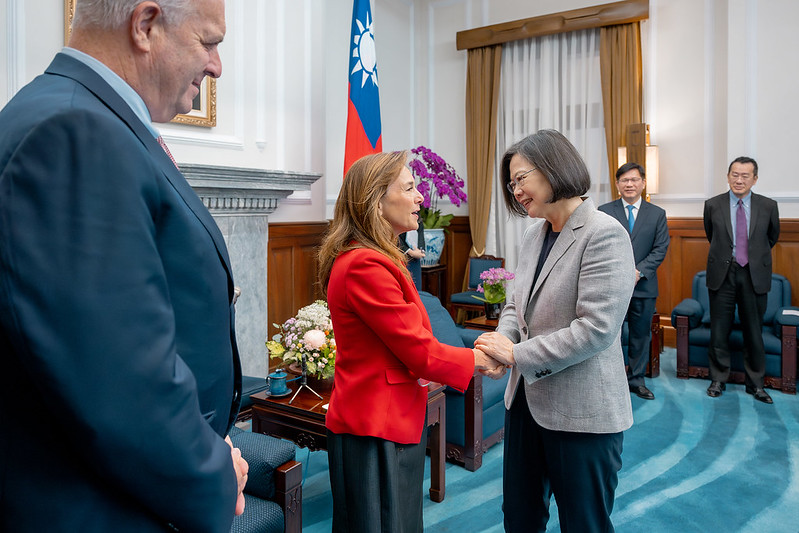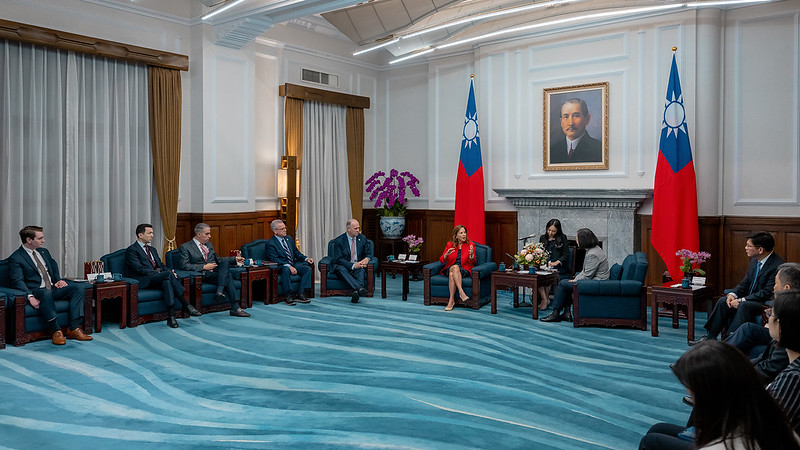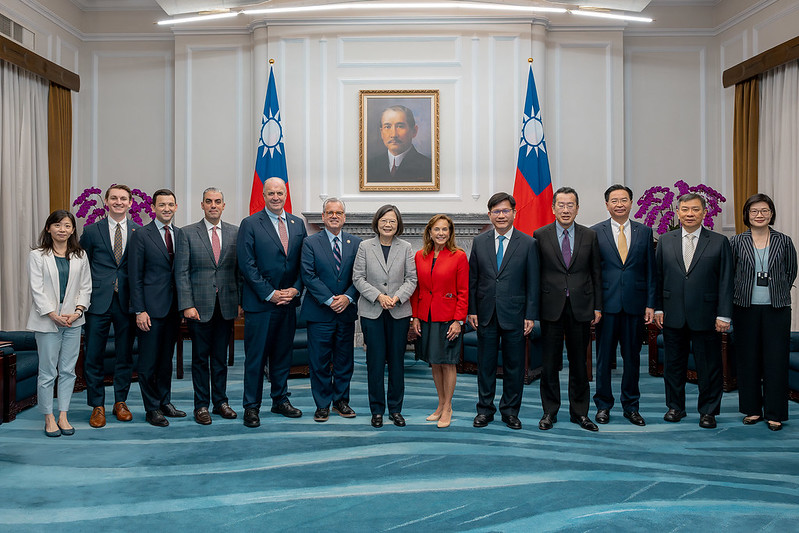News & activities
 News releases
News releases
On the morning of April 24, President Tsai Ing-wen met with a United States bipartisan congressional delegation led by Representative Lisa McClain, secretary of the House Republican Conference. In remarks, President Tsai thanked the US for signing into law the Further Consolidated Appropriations Act, 2024, which provides even more resources for measures and initiatives supporting Taiwan. She expressed hope for the US-Taiwan Expedited Double-Tax Relief Act being passed at the earliest possible juncture, which will boost two-way investment between Taiwan and the US, encourage even more industrial cooperation, and help us jointly build a more optimal environment for bilateral exchanges. On the Indo-Pacific Security Supplemental Appropriations Act, 2024, which had just been passed by the US Senate on April 23 (US EST), she thanked the US Congress for supporting Taiwan through concrete action, adding that it has played an important part in enhancing Taiwan-US cooperation across many sectors. The president emphasized that Taiwan will continue to work with the US and other countries to strengthen the democratic alliance, creating a more stable and prosperous world.
A translation of President Tsai’s remarks follows:
I extend a warm welcome to the esteemed members of this bipartisan congressional delegation to Taiwan. Secretary McClain and Representatives Dan Kildee and Mark Alford are members of the Congressional Taiwan Caucus. You have long paid close attention to Taiwan-related issues and have backed Taiwan’s international participation by sponsoring and co-sponsoring legislation.
For instance, the House of Representatives recently passed the Indo-Pacific Security Supplemental Appropriations Act, 2024 on April 20, which allocates funding for Taiwan-US security cooperation. And I am pleased to note that the act has just been passed by the US Senate on April 23. I would like to thank our guests for supporting Taiwan through concrete action. You have played an important part in enhancing Taiwan-US cooperation across many sectors.
This year marks the 45th anniversary of the enactment of the Taiwan Relations Act (TRA). Faced with expanding authoritarianism, Taiwan and the US must work even closer to jointly contribute to peace and stability in the Indo-Pacific region. I thank the US administration and Congress for continuing to approve military sales to Taiwan based on the TRA and the Six Assurances. The Further Consolidated Appropriations Act, 2024, which has been signed into law, will provide even more resources for measures and initiatives supporting Taiwan.
Taiwan and the US are important economic and trade partners. Following the signing of the first agreement under the Taiwan-US Initiative on 21st-Century Trade, we look forward to the US-Taiwan Expedited Double-Tax Relief Act being passed at the earliest possible juncture. It will not only boost two-way investment between Taiwan and the US, but also encourage even more industrial cooperation. And it will help us jointly build a more optimal environment for bilateral exchanges.
In closing, I once again welcome you to Taiwan. Taiwan will continue to work with the US and other countries to strengthen the democratic alliance so that together we can create a more stable and prosperous world.
Secretary McClain then delivered remarks, first thanking President Tsai for being with them today. She said that although President Tsai is leaving office soon, the impact the president has made here is remarkable. Taiwan is a free, democratic, and strong nation, she said, and under President Tsai’s leadership, the US has watched her entire tenure with great admiration, adding that they have come to understand more and more the importance of a strong relationship between the US and Taiwan.
Secretary McClain said that every day Taiwan faces threats from the Chinese Communist Party, whether it is military actions over our skies, aggressive maneuvers in our waters, or economic pressures. She noted that we are constantly fighting for our freedoms, and that if there is one thing in the world that the US stands for, it is freedom. She then pointed out how US history is one of overcoming oppression to ensure freedom for all, and that Taiwan’s history is unique and quite similar. That is why our bond, she stressed, even though we are separated by an ocean, is strong and enduring.
Secretary McClain said that she is proud to be standing here today on this beautiful island with President Tsai, a courageous and inspiring leader. She noted that the president is certainly leaving big shoes to fill, but that she is excited and hopeful for the future of Taiwan, adding that there are bright things ahead. In closing, the secretary said she is honored to be here this morning and that she looks forward to a productive meeting here shortly.
Representative Kildee also delivered remarks, first thanking the president for receiving their bipartisan congressional delegation. He then offered his congratulations to President Tsai and to the people of Taiwan on another successful democratic election, saying that it sends a very important message to the people of the world about the power of democracy. The representative also congratulated President Tsai on finishing her term as president and said that he looks forward to her continuing to make great contributions to this country and to the rest of the world using her voice.
The US and Taiwan are close friends, Representative Kildee said, and we have a strong people-to-people relationship and our governments work very well together. He explained that their purpose for this visit is to build on that very strong relationship as we move forward to face the challenges of the 21st century.
Representative Kildee pointed out that the timing of their visit is important, as the recent passage of the Indo-Pacific supplemental appropriations bill provides necessary support. He added that they are also engaged in very important trade negotiations. And as a member of the Ways and Means Committee, which oversees trade and taxation, Representative Kildee said that he is committed to seeing the trade negotiations through, but also ensuring that we deal with this issue of double taxation, because it will make a difference for both of our peoples. On the latter issue, he said he is committed to seeing that through before he leaves Congress at the end of the year.
In closing, Representative Kildee said that it is a highlight for him to be able to, in his last year in Congress, meet a leader, a person who he has admired for a very long time. He said that he very much looks forward to working closely with President Tsai and her government for the remainder of the year, and in his new role, whatever that may be, continuing to support this great relationship.
Representative Alford then delivered remarks, saying that good people make great sacrifices to be inspirational leaders. He thanked President Tsai for being such an inspirational leader on the world stage.
Recognizing the 45th anniversary of the TRA, Representative Alford said that they renew their resolve with the president to make available such defense services in such quantity as may be necessary to enable Taiwan to maintain sufficient self-defense capabilities. To do that, he explained, they must reduce the backlog of delivery of foreign military sales as rapidly as possible so that Taiwan can achieve an agile and survivable defense force.
Representative Alford also recognized another assurance of the TRA, which is to maintain their capacity to resist any resort to force or other forms of coercion that would jeopardize Taiwan’s security or its social or economic system. He said that this means strengthening our trade, eliminating double taxation policies, and helping Taiwan elevate its standing and influence on the world stage.
Representative Alford said that while the TRA with the US has given birth to what some call "strategic ambiguity," let no one doubt today their support for President Tsai, Taiwan, for its people, and for our bright future together. Today, he said in closing, they are here as friends and colleagues in a bipartisan manner to say to the president and to all of Taiwan that we stand together, we must be ready to stand united against the forces of aggression, and together promote the ideals of freedom and democracy in the Indo-Pacific region.












